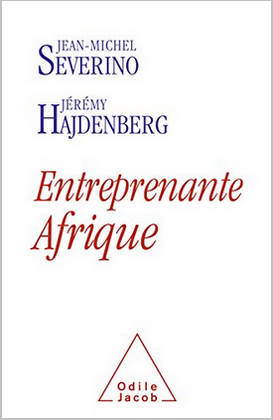Entreprenante Afrique
Submitted by admin on Tue, 09/27/2016 - 23:00
Entreprenante Afrique was published in September 2016 (Odile Jacob). Jean-Michel Severino and Jérémy Hajdenberg demonstrate how the economic growth and the development of the African continent is building upon a booming private sector, and most specifically upon emerging startups and small growing businesses.
Authors
Jean-Michel Severino is the CEO of Investisseurs & Partenaires (I&P), an impact investment group dedicated to African SMEs. He previously held the position of Vice-President for East Asia at the World Bank (1996-2000) and Chief Executive Officer of the French Development Agency (AFD) from 2001 to 2010. He co-authored with Olivier Ray the book “Africa’s Moment” (Odile Jacob, 2011).
Jérémy Hajdenberg, Chief Investment Officer at I&P, is a microfinance specialist. He has been working with African entrepreneurs for several years, accompanying them in their management and development strategies
About the book
Sub-Saharan Africa is evolving very rapidly, experiencing an average 5% annual growth rate since 2000. By 2050 the GDP of the continent (+611% since 2010) could reach EU’s current GDP, while its population will rise to more than 2 billion inhabitants, representing 20% of the world’s population, as recalled by Jean-Michel Severino and Jérémy Hajdenberg in their book “Enterprising Africa” (Odile Jacob, 2016)
According to the authors, this expansion is driven by a booming private sector, a range of dynamic SMEs and a new generation of entrepreneurs; often young, well trained and qualified, and frequently coming from the diaspora.
“They are very creative and innovative. These entrepreneurs offer goods and services that fit the local demand and target high-potential markets that are often neglected by international groups”
Jean-Michel Severino, CEO of the impact investing group Investisseurs & Partenaires (I&P)
“Companies under 250 employees account for 20% of the jobs in South Africa, Burundi and Cameroon; between 30 to 40% in Côte d’Ivoire, Kenya, Malawi and Tanzania. In other words, they are a strategic asset for the continent’s economic growth, today and in the decades to come” affirm Jean-Michel Severino and Jérémy Hajdenberg, who explore in their book a wide range of entrepreneurial adventures, including some renowned success stories such as Aliko Dangote or Mo Ibrahim’s.
“These are emblematic success stories, but we have also met many entrepreneurs who are still operating in their garage, workshops or small factories and who will become tomorrow’s champions”
Jérémy Hajdenberg, Chief Investment Officer at I&P.
From agro-industry to telecommunications, from the construction sector to health, tourism and energy, the authors delve into a new and inclusive African economy, spurred by the emergence of the middle class. Currently estimated at 370 million people, African middle class could represent 582 million people by 2030 according to the African Bank of Development (AfDB). “This emerging middle class explains the entrepreneurial dynamism for two main reasons. First, it represents a growing domestic market, which opens new opportunities for local SMEs. Secondly, most of today’s entrepreneurs come from this middle class” explain the authors, fighting against preconceived ideas on the subject.
“Thanks to this dynamic private sector, Africa is becoming more competitive. The exports of manufactured goods have increased by 8% every year since 1980 and the economy of the continent is much more driven by its rising domestic market than by raw materials’ exportations, as the rate of household consumption has been increasing yearly by 5% since 2000”, says Jean-Michel Severino.
“The entrepreneurial adventure Sub-Saharan Africa is experiencing is not to be limited to the continent. The phenomenon is highly significant for the rest of the world” conclude Jean-Michel Severino and Jérémy Hajdenberg. This “Africa on the rise” offers growth and job prospects to the rest of the world. For example about 830 000 jobs could be created in France by 2030 as a result of trade with Sub-Saharan Africa, and 1 200 000 jobs considering the continent as a whole.

 Read more
Read more